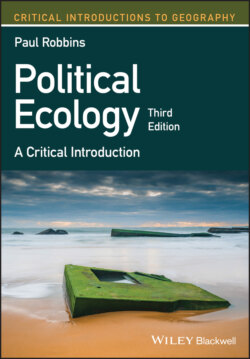Читать книгу Political Ecology - Paul Robbins - Страница 11
Оглавление
Acknowledgments
Writing requires a rare space that is comfortable and intellectually challenging. I've been lucky to have had three such spaces. Thanks to Ohio State University Geography and Larry Brown for being my first intellectual home and to University of Arizona Geography and Development, John Paul Jones, and Sallie Marston for being my second. My last seven years as Director and Dean of the Nelson Institute for Environmental Studies at the University of Wisconsin‐Madison have been perhaps the most transformative for me, since I have been surrounded by so many pragmatists and innovators as to make my ambivalent commitments to problem‐solving more apparent, at least to me.
All of the researchers I approached in the preparation of this volume and the previous editions were invaluable, including Arun Agrawal, Tom Bassett, Fikret Berkes, Betsy Beymer‐Farris, Piers Blaikie, Harold Brookfield, Judith Carney, David Correia, Diana Davis, Susanne Freidberg, Larry Grossman, Julie Guthman, Suzanna Hecht, Christian Kull, Rebecca Lave, Tania Li, Nancy Peluso, Dianne Rocheleau, Joel Wainwright, and Michael Watts. I am also in debt to my many colleagues around the world, who answered e‐mails, read drafts, and explained complex problems so that even I could grasp them, including Simon Batterbury, Tor Benjaminsen, Denis Gautier, Tony Bebbington, Susanna Hecht, Noriko Ishiyama, Brad Jokisch, Thembela Kepe, Rheyna Laney, Becky Mansfield, Brian Marks, Kendra McSweeney, Ian Scoones, and Randy Wilson. My dawning recognition of the revolutionary power of international political ecology is owed to many, but these certainly include Giorgos Kallis and Christos Zagrofos. Michael Shellenberger and Ted Nordhaus edited some of my most confusing text and restored to me some critical part of my modernity.
The several years of my own fieldwork described throughout the book would have been impossible without the help of David Bennett, Anil Chaangani, Ashwini Chhatre, Jody Emel, Susan Gilbertz, Douglas Johnson, David McGinnis, Krithi Karanth, Ilse Kohler‐Rollefson, Komal Kothari, S. M. Mohnot, Julie Sharp, and Hanwant Singh Rathore. Thanks also to Justin Vaughan and Ben Thatcher at Wiley‐Blackwell. The work and thinking of all members of my graduate “collective” are present throughout this volume, but most notably Trevor Birkenholtz, Kristina Bishop, Heidi Hausermann, Justyn Huckleberry, Stephen Martin, Katharine Meehan, Jennifer Rice, Vaishnavi Tripurenini, and Mayank Vikas. Thanks to Bob Toborg, Frank Forgione, and Dave Feroe for being the intended audience of the volume. The Department of Geography at the University of Denver and the Kulturstudier program in Ghana are wonderful institutions and were generous with collegiality and space. Thanks there to Andy Goetz, Matthew Taylor, Siri Fagerheim, and Liv Adams. Finally, and very likely against their wishes, Billie Lee Turner II and Andrew “Pete” Vayda remain inspirations for this work. China Mieville gave me a lesson on utopia and dystopia during our productive encounter in 2014 which I will never forget.
Most importantly, throughout the whole process Sarah Moore continued to insist not only that another edition of the book would eventually get finished (despite my strong doubts) but that at least one person would eventually agree to read it; her comments on and support for my writing have saved a great many confusions and embarrassments over the years (the word “penultimate” means next to last, for example; who knew?). Her knowledge of the politics of waste and consumption was invaluable and her contributions are evident throughout this book.
Having said this, the interpretations and perspectives contained within the text are my own, and I certainly can’t lay blame at anyone else’s feet for controversial, confusing, or bizarre claims. The reader will have to address any complaints to me.
Paul Robbins, July 2019
